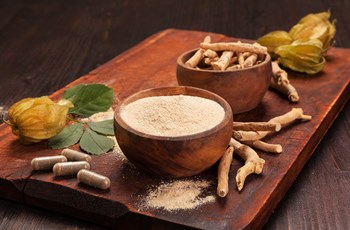Ashwagandha: Ancient Medicine for Modern Adrenals
Over the past few years, dozens of Moon Milk recipes have appeared on various culinary and wellness blogs. These beautifully colorful and fragrant bedtime drinks are a trendy twist on the traditional Ayurvedic preparation of warm milk with an adaptogenic herb, usually Ashwagandha, given at bedtime to promote restorative sleep. Cow, coconut or nut milk may be used, and recipes often include other herbs to help promote sleep and alleviate stress, such as nutmeg, chamomile, skullcap or lavender. Variations range from a more traditional Golden Milk with turmeric and warming spices featured on Bon Appetit, to the beautifully fragrant Vanilla Rose Moon Milk, to the visually stunning Mermaid Latte made with blue matcha.
For over 3000 years, Ashwagandha has been used as a "Rasayana" or rejuvenator within Ayurvedic medicine, to promote youthful vigor, muscle strength and endurance
Moon Milk is just one way to take Ashwagandha (Withania somnifera), an Ayurvedic botanical medicine that is enjoying a renaissance for addressing the health issues that accompany chronic stress. For over 3000 years, Ashwagandha has been used as a "Rasayana" or rejuvenator within Ayurvedic medicine, to promote youthful vigor, muscle strength and endurance [1]. Similarly, in Western herbalism, Ashwagandha is valued as an adaptogen – an herbal modulator which can help restore hormone balance and healthy function in various body systems, but especially the adrenal glands, helping to promote stress resistance and energy throughout the day.
Ashwagandha has gained in popularity so much in recent years that, here in the Portland Metro area, we need not leave the urban growth boundary to find a farmer cultivating this herb in and around the city. In fact, it is one of the most frequently discussed botanicals among ZRT Laboratory’s Clinical Consultants on any given day, whether in the context of adrenal stress profiles, male and female hormone profiles, weight management or neurotransmitter testing.
Current clinical research largely supports the traditional uses of this plant in promoting a more “youthful” physiology in terms of stress resilience, hormone levels including cortisol, thyroid hormones, DHEA and testosterone, body composition, sexual function, memory and cognition. In this article, we will focus on recent randomized, double-blind, placebo-controlled studies supporting these stress-related health benefits of Ashwagandha:
Modulating Stress Response and Cortisol Levels
Stress is all too familiar to most of us as a state of mental or emotional strain or tension. The stress response is reflected in the body by an acutely elevated cortisol level which can be associated with agitation, irritability, anxiety, and sleep disturbances. Under ordinary circumstances, cortisol levels should return to the normal range within several hours following an acute stressor. However, if stressors persist, the brain and adrenal gland axis may become downregulated, and with significant enough hypothalamus-pituitary-adrenal (HPA) axis dysfunction cortisol levels may drop to normal and eventually low levels. Chronic stress over a prolonged period of time often leads to conditions such as weight gain in the waist, muscle and bone loss, depression, and immune suppression.
As an adaptogen, Ashwagandha is well-known for reducing stress and anxiety in humans. This effect was supported by a 2014 systematic review of 5 human trials which concluded that treatment with Ashwagandha resulted in significantly greater score improvements (than placebo) in outcomes on various symptom scales of stress and anxiety [2].



Admin
Lorem ipsum dolor sit amet, consectetur adipiscing elit, sed do eiusmod tempor incididunt ut labore et dolore magna aliqua.
admin
Ut enim ad minim veniam, quis nostrud exercitation ullamco laboris nisi ut aliquip ex ea commodo consequat.